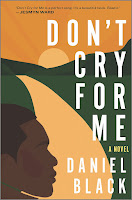Don't Cry for Me is a beautifully written, poignant book, full of regret.
“No one should diminish themselves to prove their love.”
This one hurt my heart. I got it as a Book of the Month add-on in March because I had FOMO after not ordering it in February. But I don’t necessarily agree with BOTM’s classification of it as historical fiction, because while it does recount some older events, the book is set in (relatively) present day.
Jacob is dying, and he’s mostly alone. He decides to write to his estranged son, Isaac, to ask for forgiveness for how he treated him through the years. And as he tries to explain why he is the way he is, he goes back to his childhood, where he was raised by his grandparents in rural Arkansas and never got more than an 8th-grade education.
Jacob writes about the way boys and men were expected to act, particularly Black men, during that time, and details a number of incidents through his life in which he acted less than honorably, toward fellow classmates, impaired people from his town, and his ex-wife, Isaac’s mother. And while he now realizes that the things he did were wrong and he regrets them, he feels his actions were more a product of his time and his upbringing.
But Jacob’s biggest regrets are for the way he treated his son, whom both he and his wife could sense was different even early on. Isaac’s biggest sin was not being a “real man,” not being masculine, not liking sports, and ultimately, his sexuality. Jacob’s detailing of his cruelty toward his son certainly hit close to home, and the deterioration of their relationship will feel familiar to those who found themselves treated similarly.
This is certainly a powerful book. It made me sad and angry, sometimes simultaneously, and at times I wished the book was more of a give-and-take between the characters rather than Jacob’s letters. But perhaps Don't Cry for Me can provide comfort or explanation as well as an example of sheer poetry in storytelling.

No comments:
Post a Comment